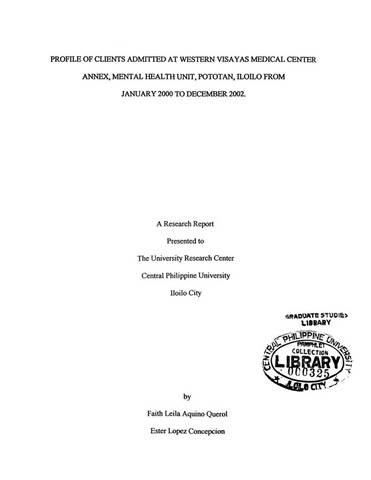Knowledge, attitudes and practices of family health caregivers of mentally ill clients in Jaro District, Iloilo City

Page views
1,071Date
2001Author
Thesis Adviser
Defense Panel Chair
Share
Metadata
Show full item record
Abstract
This study was conducted to determine the knowledge, attitudes and practices of family health caregivers in the care of the mentally ill client at home. It aimed to determine whether knowledge, attitudes and practices of family health caregivers vary according to selected characteristics such as age, sex, educational attainment and monthly income, as well as duration of the client’s disease. Furthermore, the study intended to determine whether there is a relationship between the knowledge, attitudes and practices of family health caregivers. It also attempted to find out whether knowledge and practices are related when attitude was controlled.
The respondents in this study consisted of 94 caregivers of adult mentally ill clients from Jaro district who consulted with Iloilo City’s “Save the Mentally Ill” program.
This study made use of the descriptive relational design. Data were gathered using a structured interview schedule prepared by the researcher with some items adapted from the Family Distress Scale for Depression. The data was processed and analyzed using the SPSS PC for Windows software.
The results of the study showed that the caregivers were on the average 51.3 years old; female and college-educated. Most of them were mothers and belonged to the lower income level. Most of them had taken cared of clients who had been sick for less than 4 years.
The result of the study showed that the caregivers had average to high knowledge about mental illness concepts. Knowledge about definition and causes of mental illness varied according to sex and duration of the client’s disease but was independent of the caregivers’ age, level of education and monthly income.
Knowledge on signs and symptoms and treatment of mental illness were likewise found to be independent of the caregivers’ age, sex, level of education and monthly income and duration of the client’s disease.
On the other hand, regardless of the caregiver’s age, sex. level of education, monthly income and duration of the client’s disease, the caregivers tended to have good attitude towards mental illness, and to have fair attitude towards the mentally ill client.
Promotive care practices was found to be varied according to age, but not according to sex, level of education, monthly income and duration of the client’s disease. Moreover, preventive care practices and curative care practices were found to be independent of the caregivers’ age, sex, level of education, monthly income and duration of the client’s disease.
It was also noted that the caregivers' level of knowledge on mental illness is not associated with the caregivers’ attitudes towards mental illness and the mentally ill client.
The caregiver's attitudes towards mental illness and the mentally ill client are significantly associated with practices in the care of the mentally ill client.
However, the caregivers’ level of knowledge on mental illness concepts has no bearing on their practices in the care of the mentally ill client.
Based on the significant findings of this study, the following conclusions and generalizations are derived:
1. Generally, caregivers in this study had average to high knowledge on mental illness concepts. Among the three categories on knowledge, the caregivers were more knowledgeable on signs and symptoms of mental illness and least knowledgeable on treatment of mental illness.
2. The caregivers’ knowledge on mental illness concepts slightly varies according to sex and duration of the client’s illness. However, regardless of their age, level of education and level of monthly income, the caregivers tended to have average to high knowledge on mental illness concepts.
3. The caregivers’ attitudes towards mental illness and the mentally ill client are not associated with their selected characteristics as well as the duration of the client’s disease.
4. Practices in the care of the mentally ill client, specifically promotive care practices, varied according to age. However, irrespective of the caregiver’s sex. level of education, level of monthly income and duration of the clients’ illness, the caregivers tended to have very satisfactory practices in the care of the mentally ill client.
5. The caregivers’ knowledge on signs and symptoms of mental illness concepts has no important bearing on the caregivers' attitudes towards mental illness and the mentally ill client.
6. The caregivers’ attitudes towards mental illness and the mentally ill client influence their practices in the care of the mentally ill client.
7. Practices is not associated with the caregiver’s level of knowledge.
8. Knowledge about mental illness influenced practices in the care of the mentally ill client when attitudes towards mental illness was controlled. For respondents with high knowledge about mental illness, the relationship between knowledge and practices strengthened when attitudes towards the mentally ill client was controlled, however, for respondents with average to low knowledge, the relationship between knowledge and practices weakened. This means that the degree of attitude experienced by the caregivers influences to some extent the relationship between knowledge about mental illness and practices in the care of the mentally ill client. This is consistent with Roger’s theory which states that behavior is the result of learning, likewise, behavior is motivated by a person's subjective thoughts and feelings. This also supports the assumption that attitudes are important determinants of behavior.
In view of the significant findings and conclusions, the following recommendations are given:
1. Since many caregivers still have insufficient knowledge about mental illness, it is recommended that information, education and communication on the disease be continued. Nurses and other health care providers should continue to give short lectures and seminars among caregivers, while waiting to be consulted at out-patient clinics and while the client is admitted at the hospital. Mass media such as radio can also be used as avenue for information dissemination to eliminate misconceptions about mental illness and to lessen social stigma.
2. Since caregivers have only fair attitudes towards the mentally ill client, support groups should be organized to improve attitudes toward the mentally ill. Doctors, nurses and other health providers should organize hospital or clinic-based support groups which can help family caregivers gain more information about mental illness from health personnel and their peers, share their experiences and provide moral support to each other.
3. Community health nurses and midwives being the primary health care providers should be encouraged to attend lectures, seminars, workshops and other educational activities on mental illness to equip them with knowledge and expertise in educating the family caregivers about mental illness and assisting them in taking care of the client at home.
4. Community health providers should conduct home visits to assess and evaluate practices in the care of the mentally ill client at home.
5. A similar study should be conducted including other variables not included in this study such as coping behaviors of family caregivers and factors affecting mental illness. Similar studies on other diseases with similar impact on the family such as mental retardation and other chronic diseases are encouraged.
Description
Abstract only
Suggested Citation
Mendoza, J. H. (2001). Knowledge, attitudes and practices of family health caregivers of mentally ill clients in Jaro District, Iloilo City (Unpublished Master's thesis). Central Philippine University, Jaro, Iloilo City.
Type
ThesisSubject(s)
Keywords
Department
School of Graduate StudiesDegree
Master of Arts in NursingShelf Location
GSL Theses 610.73072 M469
Physical Description
xvii, 153 leaves
Collections
Related items
Showing items related by title, author, creator and subject.
-
Profile of clients admitted at Western Visayas Medical Center Annex, Mental Health Unit, Pototan, Iloilo from January 2000 to December 2002
Querol, Faith Leila A.; Concepcion, Ester L. (Central Philippine University, 2005-09)The study was designed to determine the profile of clients in Western Visayas Medical Center Annex, MHU Pototan, Iloilo from January to December 2003. The subjects of the study were the 1094 clients who were admitted from ... -
Social support and level of care management stress among family caregivers of the mentally ill in Government Hospitals in the Province of Iloilo
Penpillo, Sheila A. (2004)This study was conducted to determine the social support and level of care management stress of family caregivers of the mentally ill in government hospitals in the Province of Iloilo. It aimed to determine whether social ... -
The effect of mental health education training on students' geography performance
Gong, Mei (Central Philippine University, 2024-08)This study aimed to determine the effect of mental health education training on students' performance in Geography. In this study, a quasi-experimental research method employing a pre-test and post-test control group design ...






